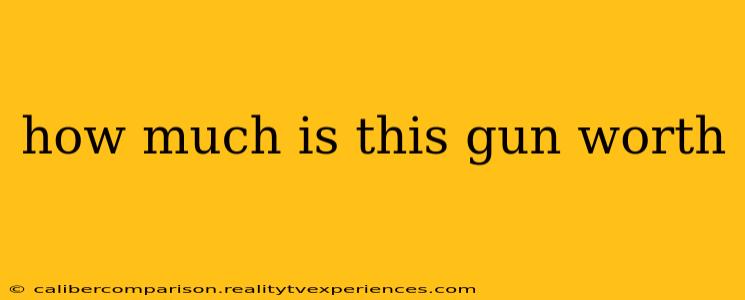How Much is This Gun Worth? A Comprehensive Guide to Firearms Appraisal
Determining the value of a firearm can be a complex process, influenced by numerous factors beyond just the make and model. This guide will walk you through the key elements that affect a gun's worth, helping you understand how to accurately assess its value. Whether you're looking to sell, insure, or simply satisfy your curiosity, understanding these factors is crucial.
1. Identifying Your Firearm: The Foundation of Appraisal
Before you can determine value, you need to accurately identify your firearm. This involves meticulously noting the following:
- Manufacturer: The brand name (e.g., Colt, Smith & Wesson, Remington) is paramount.
- Model: The specific model number (e.g., Colt Python, Smith & Wesson Model 19) is critical for accurate valuation. Minor variations within a model can significantly impact price.
- Caliber: The caliber or gauge (e.g., .38 Special, 12 gauge) dictates ammunition compatibility and influences value.
- Serial Number: This unique identifier helps verify authenticity and trace the firearm's history. Never share your serial number online without adequate security measures.
- Condition: This is arguably the most crucial factor. We'll delve deeper into this aspect below.
2. Condition: The Biggest Value Driver
The condition of your firearm significantly impacts its value. Appraisers often use a grading system, with "mint" representing perfect condition and lower grades reflecting increasing wear and tear. Consider these aspects of condition:
- Bore Condition: The inside of the barrel. Examine for rust, pitting, or excessive wear. A pristine bore significantly increases value.
- Action: How smoothly the firearm functions. A smooth, reliable action commands a higher price than a sticky or malfunctioning one.
- Finish: The overall condition of the gun's external finish. Scratches, dents, rust, and bluing wear all negatively affect value.
- Stock (or Grip): For long guns, the stock's condition (cracks, chips, damage); for handguns, the grips' condition. Original, undamaged stocks and grips are highly desirable.
- Box and Accessories: The presence of the original box, papers, and accessories (holsters, cleaning kits) substantially increases value, especially for collectible firearms.
3. Factors Beyond Condition: Enhancing or Diminishing Value
Several other factors influence a firearm's worth:
- Rarity: Limited production runs or unique features make a firearm more valuable.
- Historical Significance: Association with a historical event or figure can significantly increase value.
- Demand: Current market demand for a particular make and model directly impacts its price.
- Modifications: Aftermarket modifications can either increase or decrease value, depending on their quality and desirability. Unprofessional modifications will usually lower value.
- Location: Pricing can vary by region due to local laws, demand, and market conditions.
4. How to Determine Value: Resources and Methods
Several avenues exist for determining a firearm's value:
- Online Resources: Websites specializing in firearms appraisal and sales (use caution and verify the credibility of the source).
- Gun Shows and Dealers: Experienced gun dealers can provide expert opinions. Bring your firearm for in-person inspection.
- Professional Appraisers: Certified firearms appraisers offer the most accurate valuations, especially for high-value or antique firearms. This is often necessary for insurance purposes.
- Auction Results: Researching recent auction results for similar firearms can offer valuable insights into current market values.
Disclaimer: This guide provides general information. Always consult with qualified professionals for accurate appraisals, particularly for high-value or antique firearms. Always adhere to local and federal laws regarding firearm ownership and handling. The information provided here is for educational purposes only and should not be considered financial or legal advice.

